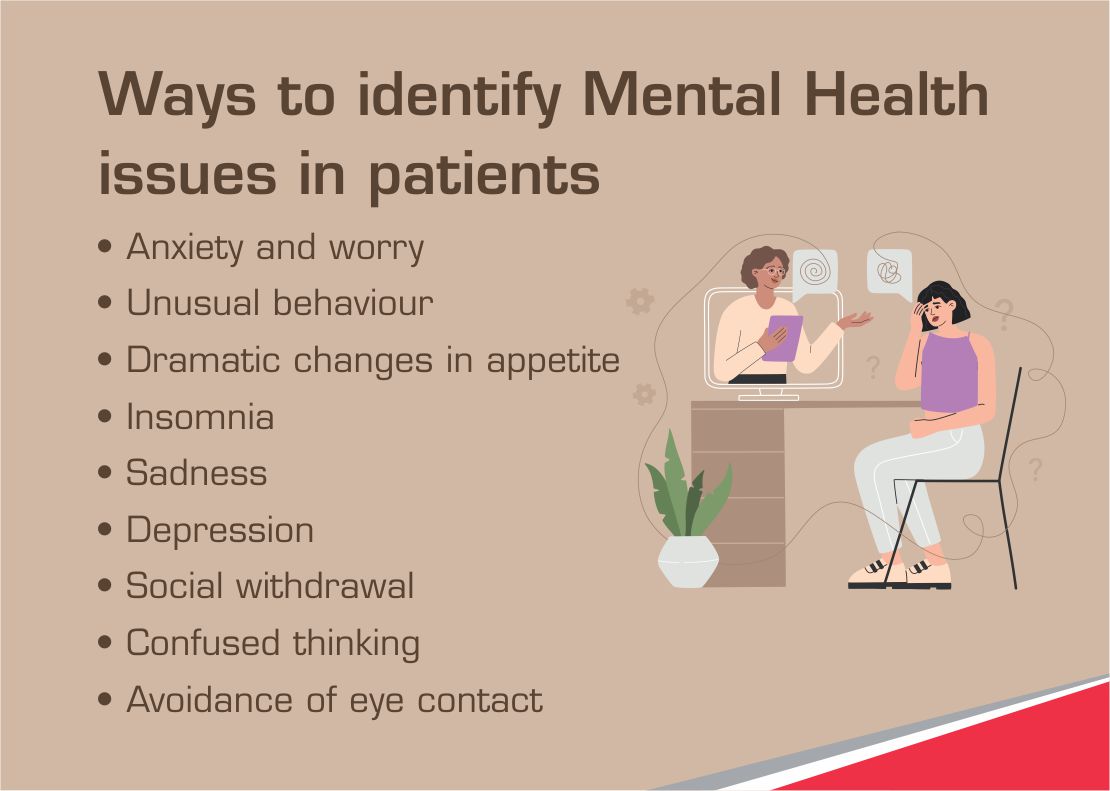Understanding the Importance of Mental Health Professionals
Mental health is an essential aspect of overall well-being, and individuals facing mental health challenges often require professional support and guidance. Mental health professionals play a vital role in diagnosing, treating, and supporting individuals with mental health conditions.
They are trained experts who specialize in understanding and addressing various mental health issues. By utilizing their knowledge and expertise, mental health professionals help individuals improve their mental health, cope with challenges, and enhance their overall quality of life.
This blog will explore different types of mental health professionals and the services they provide.

Psychiatrist
A psychiatrist is a medical doctor who specializes in the diagnosis, treatment, and prevention of mental illnesses. They are trained in both physical and mental health and can prescribe medication to manage mental health conditions. Here are some key aspects of a psychiatrist’s role:
Role of a Psychiatrist
- Diagnosing and evaluating mental health conditions
- Developing treatment plans, including medication management and therapy referrals
- Monitoring the effectiveness of treatment plans and making adjustments as needed
- Providing psychotherapy and counseling services
- Collaborating with other healthcare professionals to provide comprehensive care
- Educating patients and their families about mental health conditions
- Conducting research to advance the field of psychiatry
Education and Training Requirements
Becoming a psychiatrist requires a significant amount of education and training. After completing a Bachelor’s degree, aspiring psychiatrists must attend medical school and earn a Doctor of Medicine (M.D.) or Doctor of Osteopathic Medicine (D.O.) degree.
After medical school, they must complete a residency program in psychiatry, which typically lasts four years. Some psychiatrists also choose to pursue additional fellowship training in a specific area of psychiatry, such as child and adolescent psychiatry or addiction psychiatry.
During their training, psychiatrists gain extensive knowledge and practical experience in diagnosing and treating a wide range of mental health conditions. They are equipped to provide comprehensive care for individuals dealing with various mental health challenges.

Psychologist
Psychologists are mental health professionals who specialize in understanding and treating human behavior and mental processes. They play a crucial role in the diagnosis, assessment, and treatment of various mental health conditions. Here are some key points about psychologists:
Role of a Psychologist
Psychologists apply their knowledge of human behavior and mental processes to help individuals with various mental health concerns. Some of the roles and responsibilities of a psychologist include:
- Conducting psychological assessments and evaluations to diagnose mental health conditions
- Providing individual or group therapy sessions to address emotional and behavioral issues
- Developing treatment plans and interventions tailored to the unique needs of each client
- Conducting research to contribute to the field of psychology and improve mental health practices
- Collaborating with other healthcare professionals to provide comprehensive care and support
Education and Training Requirements
Becoming a psychologist requires an extensive educational and training journey. Here are the typical steps involved:
- Earn a bachelor’s degree: Psychologists usually begin their education by completing a bachelor’s degree in psychology or a related field. This provides a solid foundation in psychological concepts and research methods.
- Pursue a graduate degree: After completing a bachelor’s degree, aspiring psychologists typically pursue a graduate degree in psychology. This can be either a master’s degree or a doctoral degree, depending on their career goals. A doctoral degree, such as a Ph.D. or a Psy.D., is often required for independent practice.
- Complete supervised clinical experience: As part of their training, psychologists are required to complete supervised clinical experience, commonly referred to as an internship or practicum. This provides them with hands-on experience working with clients under the guidance of experienced psychologists.
- Obtain licensure: To practice as a psychologist, individuals must obtain licensure in their respective jurisdiction. The specific requirements for licensure vary by state or country but typically include passing a licensure exam and meeting certain experience and education criteria.
It is important to note that psychologists may specialize in various areas, such as clinical psychology, counseling psychology, or neuropsychology, among others. Each specialization may have its own additional training requirements and areas of expertise.
For more information about psychologists and their role in mental health care, you can visit this Wikipedia page.
Counselor
A counselor is a mental health professional who helps individuals, couples, and families work through personal and emotional challenges.
They provide guidance, support, and strategies to help clients improve their mental well-being and cope with everyday stressors. Counselors may specialize in various areas, such as marriage and family therapy, substance abuse counseling, or career counseling.
Education and Training Requirements
To become a counselor, individuals typically need to obtain a master’s degree in counseling or a related field.
They must also complete supervised clinical experience and obtain the necessary licensure or certification, which varies by state. Continuing education is often required to maintain licensure and stay informed about the latest counseling techniques and best practices.
Counselors may work in a variety of settings, including private practices, schools, community mental health centers, and hospitals. They play a vital role in helping individuals achieve personal growth, overcome challenges, and improve their overall well-being.
Social Worker
Social workers play a vital role in the field of mental health, providing support and assistance to individuals and families facing various challenges.
Role of a Social Worker
Social workers work with individuals, families, and communities to address their mental health needs. They often provide counseling, advocacy, and connect individuals to essential resources and services.
Social workers help individuals navigate complicated systems and develop coping strategies to improve their overall well-being.
Education and Training Requirements
To become a social worker in the mental health field, individuals typically need to complete a Bachelor’s or Master’s degree in social work. They may also need to acquire relevant licensure or certification depending on the state they work in.
Additionally, social workers often participate in ongoing professional development and training to stay updated with the latest practices and techniques.

Psychiatric Nurse Practitioner
A psychiatric nurse practitioner is a mental health professional who specializes in providing comprehensive psychiatric care and treatment.
They work closely with individuals of all ages who are dealing with mental health issues, including depression, anxiety, bipolar disorder, and schizophrenia.
Role of a Psychiatric Nurse Practitioner
As psychiatric nurse practitioner, their role includes:
- Assessing and diagnosing mental health conditions
- Developing and implementing treatment plans
- Prescribing medications and monitoring their effectiveness
- Providing psychotherapy and counseling
- Collaborating with other healthcare professionals to ensure holistic care for patients
- Educating patients and their families on mental health conditions and promoting self-care strategies
Education and Training Requirements
To become a psychiatric nurse practitioner, individuals need to complete the following education and training requirements:
- Earn a Bachelor of Science in Nursing (BSN) degree
- Become a registered nurse (RN) by passing the National Council Licensure Examination for Registered Nurses (NCLEX-RN)
- Gain clinical experience as a registered nurse, preferably in a psychiatric setting
- Complete a Master of Science in Nursing (MSN) or Doctor of Nursing Practice (DNP) degree with a specialization in psychiatric-mental health
- Obtain certification as a psychiatric-mental health nurse practitioner (PMHNP) through the American Nurses Credentialing Center (ANCC) or the American Association of Nurse Practitioners (AANP)
Through their specialized education and training, psychiatric nurse practitioners are equipped with the knowledge and skills to provide comprehensive mental health care, addressing both the physical and emotional aspects of psychiatric disorders.
They play a vital role in promoting the well-being and recovery of individuals with mental health conditions.
Marriage and Family Therapist
Marriage and Family Therapists (MFTs) are mental health professionals who specialize in treating individuals, couples, and families experiencing relationship or mental health issues.
They focus on improving communication, resolving conflicts, and promoting healthy relationships within the family unit. MFTs work collaboratively with their clients to identify underlying issues and develop effective strategies for achieving positive change.
Education and Training Requirements
To become a Marriage and Family Therapist, individuals must typically complete a master’s degree in Marriage and Family Therapy or a related field. They are also required to complete a designated number of supervised clinical hours and pass a licensing exam.
MFTs continue to engage in ongoing professional development and education to stay informed about the latest research and treatment approaches in the field of couples and family therapy.
Choosing the Right Mental Health Professional for Your Needs
When it comes to seeking help for mental health issues, it’s essential to find the right professional who can provide the necessary support and guidance. Here are a few important tips to consider when choosing a mental health professional:
- Assess your needs: Determine what type of mental health professional would be the best fit for your specific needs, whether it’s a psychiatrist, psychologist, therapist, or counselor.
- Research credentials: Look for professionals who are licensed and have the appropriate training and qualifications in their field.
- Consider the therapeutic approach: Different professionals may use different therapeutic approaches, so it’s essential to find one that aligns with your preferences and goals.
- Seek recommendations: Ask for recommendations from trusted sources such as friends, family, or healthcare providers.
Remember, finding the right mental health professional is a personal decision, and it may take some time and trial and error to find the perfect match. Don’t be afraid to reach out and seek help – there is support available to you.
Resources and References: NAMI, Healthline, Healthdirect, Helpline Center, INTEGRIS Health, Counselling Directory.


Leave a Reply